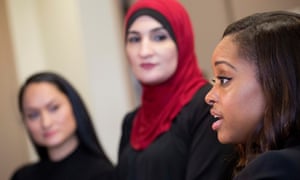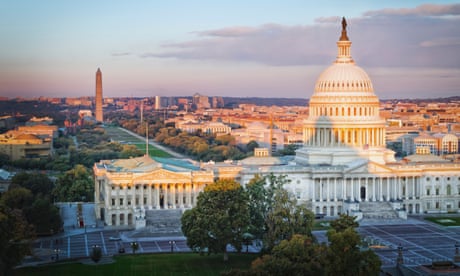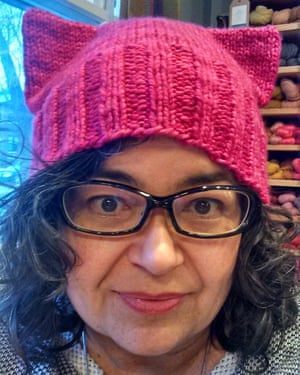Pink hats will be much in evidence as an extraordinarily wide range of groups come together to repudiate President Trump the day after his inauguration

It began as a spontaneous feminist rallying cry via social media. It has morphed into what is expected to be one of the largest demonstrations in American history – a boisterous march about a smorgasbord of progressive issues, and an extraordinary display of dissent on a president’s first day in office peppered with knit pink hats.

Before the bunting and barriers are even cleared away from Friday’s inauguration of Donald Trump, hundreds of thousands are likely to attend the Women’s Marchon Washington the following day, 21 January.
“A march of this magnitude, across this diversity of issues has never happened before,” said Kaylin Whittingham, president of the association of black women attorneys. “We all have to stand together as a force no one can ignore.”
The Women’s March now has almost 200 progressive groups, large and small, signing on as supporting partners. The issues they represent are as varied as theenvironment, legal abortion, prisoners’ rights, voting rights, a free press, affordable healthcare, gun safety, racial and gender equality and a higher minimum wage. Men are invited.
More than 300 simultaneous local protests will also occur, across all 50 states, and support marches are planned in 30 other countries, organizer Linda Sarsour said.
“We have no choice. We need to stand up against an administration that threatens everything we believe in, in what we hope will become one of the largest grassroots, progressive movements ever seen,” said Sarsour.

June Barrett, a domestic worker in Florida, was spurred to travel from Miami to Washington by Trump’s leaked audio tape in which he boasted of accosting women and “grabbing them by the *****”.
She had been sexually assaulted by an elderly man in her professional care who grabbed her genitals, she said.
“When that tape came out, I went into a bit of a depression. And I’ve had to walk away from my Baptist church after they were strongly guiding us to vote for Trump and Mike Pence. It’s shaken my whole faith. I have to march against this hate,” said Barrett.
She moved to Florida from Jamaica in 2001.
“I’m a black woman, I’m queer, I’m an immigrant and everything that’s going to happen under Trump and Pence is going to affect me, perhaps adversely. It breaks my heart that so many women voted for them,” she said, referring to results that showed, among other things, that a majority of white women voted for the Republican ticket.
The Women’s March on Washington was conceived on 9 November. Teresa Shook, a retired lawyer in Hawaii, reacting to Trump’s shock win and his comments and actions related to women, posted on Facebook suggesting a protest timed around Trump’s inauguration. The message ended up on Pantsuit Nation, one of the invitation-only Facebook support groups lauded by Hillary Clinton in her concession speech.
Support surged overnight. But there was also an outcry because it was being seen as predominantly a white event.

It was also briefly known as the Million Women March, which sparked some anger because of its echoes of the Million Man March, in Washington in 1995, and the Million Woman March, in Philadelphia in 1997, both organized as predominantly African American demonstrations to protest against racism.
Changes were quickly made to the latest event.
“The presidential election was on the Tuesday and I came in on the Friday,” said Sarsour, who is also a civil rights activist in New York and an Arab American with Palestinian roots.
Gun control campaigner Tamika Mallory, who is black, and Carmen Perez, a Latina and civil rights worker also joined the leadership team, alongside female New York fashion designer Bob Bland.
“Some people think we are tokens, but I’m not just a pretty Muslim face – we’re leading this together,” said Sarsour, who is in charge of fundraising.
Many other grassroots efforts have emerged in the planning of the march. Among the most popular is an initiative to hand-knit pink “*****hats” that thousands of attendees are expected to wear.
Larry Sabato, director of the center for politics at the University of Virginia, cited anti-Vietnam war demonstrations and civil rights-era protests that attracted crowds up to half a million as among the most prominent in US history – so far.
“It’s never happened that so many people have gathered in opposition to the new administration on day one,” said Sarsour. “Will it be the largest US mass mobilization ever? I’ll be able to tell you on January 22.”
Celebrities slated to attend include Scarlett Johansson, America Ferrera, Uzo Aduba, Zendaya, Katy Perry and Cher.
Thanu Yakupitiyage, spokeswoman for the advocacy group and march partner, the New York Immigration Coalition, is marching not just for immigrants’ rights but for women’s equality, fair police reforms and healthcare protection, she said.
“A lot of immigrant communities were scared by Trump’s vitriolic messages. Some who are undocumented or insecure may be afraid to march in Washington,” she said.
Colleen Flanagan will have to navigate her wheelchair amid seething masses of marching women.
“I may not be marching but I will personally be rolling in Washington – for all women,” said Flanagan, a Boston-based consultant on policy for the disabled.
Of Trump’s astonishing actions in mocking a disabled reporter, on camera, during the campaign, Flanagan said: “Such bullying just turns into wider discrimination in society.”
Following its rapid expansion in scale and scope, the march organizers on Thursday published the event’s new set of “unity principles”.
“It adds up to a comprehensive call for social justice and equal rights,” said Jessica Neuwirth, a human rights lawyer and president of a leading partner group, the Equal Rights Amendment Coalition.
Some progressives are still shunning the event, with reports both of white women feeling excluded by talk of race relations, and minority women citing privileged whites acknowledging too little, too late their struggle against chronic class and race discrimination.
But Jon O’Brien, who will attend the march as president of event partner Catholics For Choice, said the march is about “true solidarity”.
“There will be all kinds of people there,” he said. “White, black, LGBT, straight, Democrat, moderate Republican, rich, poor – in other words, America.”
